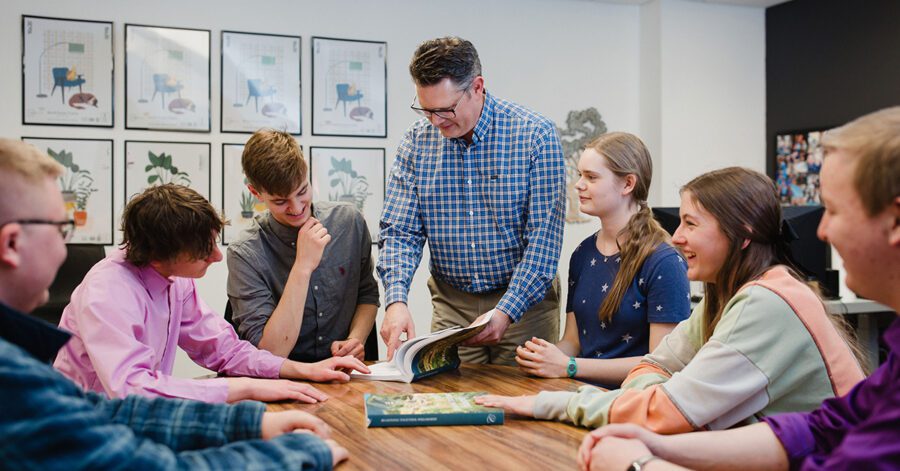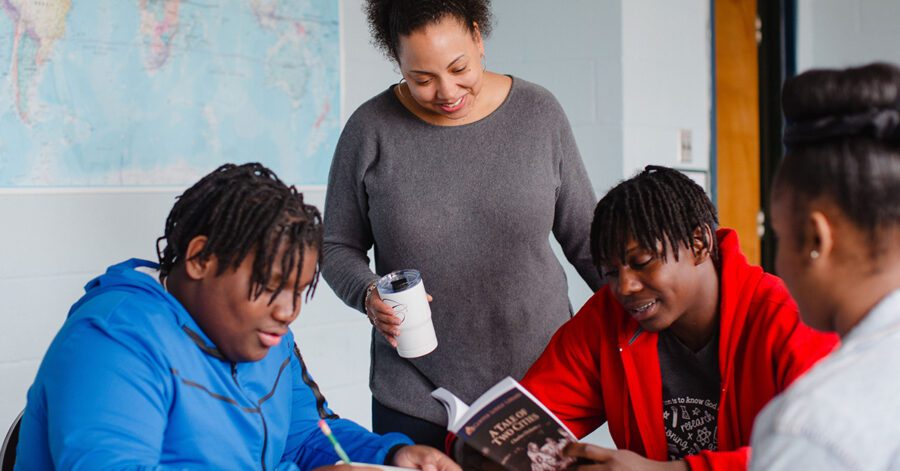If you are thinking about starting your homeschool journey, it can seem like a lonely endeavor. Making the switch from traditional public or private school to home education is a big transition, but reclaiming family-centered learning doesn’t have to be in isolation.
Homeschooling is better with a friend. At Classical Conversations, you are connected to a local community of fellow families, all walking the homeschool journey together.
Shifting perspective is often the first step when wrestling with the decision to start homeschooling. But once the decision is made, finding community can be sparked by serendipitous conversations in the grocery check-out line or at a birthday party. We look back at our homeschool journey’s path, and we see God leading those life-changing chance interactions.
Take a look at Classical Conversations dad and CFO Rex Elliot’s homeschool journey from a mainstream educational mindset to a family culture of innocent individual learning.
Is There An Alternative To Traditional Education?
“‘Get off my lawn!’ reflects how middle-aged people often feel about the younger generation. The younger crowd disrupts the carefully manicured achievements of a lifetime. They also seem to grab the fruits of that hard work before they’re fully ready.”
As people grow older, they begin to wonder why their parents’ generation refuses to step aside. This hesitation creates a crucial moment. It’s a chance for the younger generation to learn what was never taught and restore the natural cycle of life. But society is nearing a point where this transition may not happen smoothly, leading to new and unexpected challenges, especially in education.
Parents of preschool and school-age children can reconstitute their own family culture by homeschooling their children through high school. Most parents today have mistakenly accepted that the only option to educate young people is through a modern public or private school.
The recent growth of homeschooling has only begun to question that premise, and the degradation of social norms promoted in modern schools has only added fuel to the fire.
The Typical Traditional Education Model
My two oldest children began their elementary education in a parochial school in Massachusetts after I was relocated to Boston by my former employer. The school was filled with well-meaning teachers who shared our faith and values.
For five years of pre-K – 3rd-grade experiences, I felt that they were receiving a reasonable education, and my daughter’s behavior challenges, as well as my son’s lackluster math scores, could be attributed to their genetic deficiencies likely passed on from my side of the biological collision that spawned them.
It did not occur to me that any learning environment with a student-teacher ratio of 18:1 would be problematic for almost any child.
Sparking the Homeschool Journey
After I decided to semi-retire following years of frustration with a corporate culture that did not align with my family values, I moved the family south to be closer to friends and relatives.
Like many American parents, we placed the children into the local public school without hesitation. In fact, we selected our new neighborhood in the north Atlanta suburbs primarily because of the ratings that the schools there had received. They were an A+ school, but it didn’t take long to figure out that the devil had literally beaten us to Georgia and issued his own report card.
In an initial review of a single section of a 3rd grade Social Studies textbook on the topic of American Colonialism, I found almost a dozen examples where European immigrants were characterized as white opportunists who only came to the Americas to dominate the native population and exploit the land and its resources.
Meanwhile, the natives were described repeatedly as peaceable people who lived at one with nature and only wished to be left alone. Since this was occurring only six months into the COVID-19 pandemic, the children began the semester at home with personalized iPads.
From the machine, I was alarmed by the sound of my son’s teacher’s elevated-pitched rebuke of him slouching in his chair while staring at Pandora’s version of Brady Bunch boxes. I began to pay more attention to the content distributed through the state-issued screens.
George Orwell would have been undisturbed to find Bill Gates explaining the benefits of online learning, Anthony Fauci instructing kids how to protect their teachers from disease with masks and social distancing, and Bill Nye summarizing the dangers of climate change. I, however, was a bit surprised and not amused.
Providing A Homeschool Community
I was 90% there already, but a little research into the Social & Emotional Learning (SEL) curriculum the school was planning to roll out later in the year completed the task of pushing my family out of the modern school nest. But where would we go? Public school was out of the question. The Parochial schools did not have enough places for both children in their assigned grades for the spring semester.
On All Hallow’s Eve of 2020, God would provide the answer. As I enjoyed the Covid modified Trick-or-Treat festivities throughout our new neighborhood with my impending truancy-problem children, my far more sociable wife welcomed the other Covid shut-ins by giving them all much-appreciated candy, mostly my favorite chocolates, in anticipation of extra inventory.
One such wayward group belonged to a beautiful family that lived just half a street away. As it turns out, they shared some common history with my wife, and their lengthy conversation turned to schooling. They were a Classical Conversations family, as the Holy Spirit would have it. With no other viable options immediately in front of us and only dread and despair behind us, we desperately waded into the homeschool ocean.
Homeschool Dads Can Lead
Since I had stepped away from a corporate career—another worthwhile story for another day—and my wife had a complete lack of knowledge or experience with homeschooling and considerable skepticism, I became a homeschooling dad for our children in their first CC Community.
My own ignorance was astounding, so much so that I taught that first semester having only stepped into one Community Day with the family. I was able to muddle through using the e-zines and my own ingenuity. Luckily, my wife attended every Community Day with the children and, after seeing how it was supposed to be done, offered to take over that fall. All were grateful.
Classical Conversations Communities Equip Families
What I witnessed with my immigrant wife, whose first language was not English nor home culture even within Western Civilization, still has me transfixed. I grew to love her even more as I watched her innate organizational skills and personal drive to succeed in building a thriving education environment.
She was successful in large part because of the support she received from the CC community, our neighbor, and our new friend. They not only gave her tools for her newfound teaching career, but they also gave her a social outlet and network of co-collaborators in this incredible parent-led educational journey.
Most importantly, I saw my children regain their innocence and grow into the unique individuals God had designed them to be. We have avoided at least some of past generations’ errors regarding our children’s education and are building a family culture of our own choosing. As a dad, I can only say, “Thank you.”
Frequently Asked Questions
What does Classical Conversations believe?
Classical Conversations emphasizes that all subjects are deeply interconnected, with God as the ultimate author and creator of each one. As we explore each subject, we gain a deeper understanding of God’s nature, and in turn, knowing more about God enriches our understanding of every subject being taught.
What curriculum does Classical Conversations use?
Classical Conversations Foundations curriculum, grounded in memorization, equips parents and tutors to guide children in building a solid grasp of essential subjects such as history, science, English, geography, math, and Latin, all presented through a Christian lens.
Challenge programs offer a curated curriculum in the six strands of grammar, reasoning, research, logic, debate, and exposition.
Why homeschool with Classical Conversations?
Homeschooling with Classical Conversations connects you to a supportive network of families who grow and learn alongside one another. It provides parents with the resources and encouragement they need to nurture unique, engaged students who embrace learning throughout their lives.
Final Thoughts: The Homeschool Journey
The decision to create family-centered learning in your home is usually marked by tiny realizations and perspective shifts over time. Reclaiming your family’s values at the heart of learning is a blessing that will have ripple effects for generations.
Are you looking to connect with like-minded families along your homeschool journey who are focused on classical Christian education? Find out more about Classical Conversations and join an Information Meeting near you.




